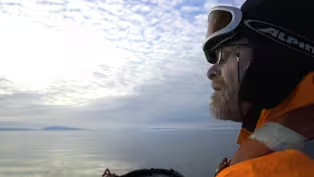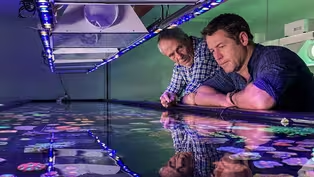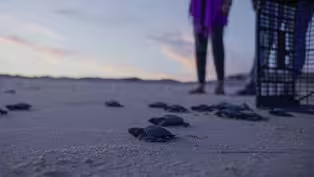
Coral Collection
Clip: Episode 3 | 6m 53sVideo has Closed Captions
Coral Reefs make up less than 1% of the ocean, but support a quarter of all marine life.
Coral Reefs make up less than 1% of the ocean but support a quarter of all marine life and provide food, income and protection from storms for around one billion people worldwide. Each coral specimen collected will be taken ashore to live in a specially-designed facility where it can be protected for the future.
Problems playing video? | Closed Captioning Feedback
Problems playing video? | Closed Captioning Feedback

Coral Collection
Clip: Episode 3 | 6m 53sVideo has Closed Captions
Coral Reefs make up less than 1% of the ocean but support a quarter of all marine life and provide food, income and protection from storms for around one billion people worldwide. Each coral specimen collected will be taken ashore to live in a specially-designed facility where it can be protected for the future.
Problems playing video? | Closed Captioning Feedback
How to Watch Dynamic Planet
Dynamic Planet is available to stream on pbs.org and the free PBS App, available on iPhone, Apple TV, Android TV, Android smartphones, Amazon Fire TV, Amazon Fire Tablet, Roku, Samsung Smart TV, and Vizio.
Buy Now
Providing Support for PBS.org
Learn Moreabout PBS online sponsorship[soft music] narrator: Some parts of the ocean are facing multiple climate threats.
But now a group of conservationists are on a unique mission to save one of the most vulnerable ecosystems of all.
♪ ♪ - The Great Barrier Reef is the most spectacular place on the face of this planet.
♪ ♪ The grandeur and the size of the beauty is beyond description.
♪ ♪ I must be a bit biased, but there is nothing like a coral reef.
I'm happiest just being out on the reef all day long.
It's my home ground.
narrator: In the world of marine science, Charlie Veron is known as the "Godfather of Coral," which is why marine conservationist Dean Miller has joined him on today's special mission.
- I'm going to help you get yours on first, Charlie, and then I'll put my tank on.
Charlie literally wrote the book on corals.
There is probably no one on Earth that has dived in more coral-reef locations and as many times as Charlie has.
Okay, Charlie, you're good to go.
If you want to go sit on the bottom, we'll come and meet you.
- Perfect.
You're a good man.
- Thank you.
♪ ♪ ♪ ♪ Working with Charlie underwater is hugely exciting to me.
He's collected corals, and he's described them, and he's named 20% of the world's species.
♪ ♪ To see Charlie identify corals to a species level is phenomenal.
There's only about five people on the planet that can actually do this.
narrator: But today's job is about more than just identifying coral.
♪ ♪ The team is attempting to save the Great Barrier Reef before it's too late.
- Since 2016, we've had four mass-bleaching events in six years.
And in that short time frame, we've seen devastating changes take place, and that's because of climate change and the increase in sea-surface temperatures.
The corals can't go anywhere, so they're literally bathed in, you know, water that was three, four degrees above average, and, effectively, they cooked and died.
narrator: Increasing temperatures aren't the only threat.
As the ocean absorbs excess carbon dioxide from the atmosphere, it becomes more acidic, further weakening the coral.
- It made me think, why don't we go and collect every single coral species out there and create the world's first living coral biobank?
narrator: Each coral specimen will be taken ashore to live in a specially designed facility where it can be protected for the future.
The team are always on the lookout for a new species to add to their collection.
- People on this planet don't really realize that thousands of species have got some part of their life cycle in a coral reef.
♪ ♪ When you take out coral reefs, the flow-on effect is absolutely enormous.
It's not just about corals.
It's about the entire ecosystem.
It's about the entire ocean.
♪ ♪ narrator: Coral reefs are one of the most diverse and productive ecosystems in the world.
♪ ♪ They make up less than 1% of the ocean but support a quarter of all marine life and provide food, income, and protection from storms for around one billion people worldwide.
♪ ♪ From fishing to tourism, reefs pump $30 billion into the global economy each year.
[indistinct chatter] The Great Barrier Reef, the largest living structure on the planet, is the poster child for all that could be lost as we change the temperature and chemistry of our oceans.
♪ ♪ - At the rate that the reef is going down, we've almost passed counting in decades.
We're counting in years.
So we will see the demise of coral reefs in a single human lifetime.
How incredibly dangerous is that for life on this planet.
♪ ♪ Oh, wow.
That was good.
The new species.
We got it.
Hey, that was really good.
- That is amazing.
- It is, great, yeah.
- Well done, well done.
That is a great inclusion to the biobank.
- There it is.
- That's it, eh?
Amazing.
- A new species.
- Lot number 23, you're in.
- I'm not gonna just, what, play bingo and think, oh, well, go to hell with the Great Barrier Reef.
No, I'm going to do all I can.
And I think this is one of the most promising projects I've ever come across.
♪ ♪ We're doing this for the future.
We're certainly not doing it for fun.
We're doing it because we have to do it.
If we don't, what then?
♪ ♪ It has to succeed.
If it doesn't, there's no plan B.
There really isn't.
[laughs] I mean-- but that that's true, um, yeah.
How, um--it's that serious.
It really is.
Video has Closed Captions
Clip: Ep3 | 2m 45s | Seals are tagged to create a record of the increasing seawater temperature. (2m 45s)
Video has Closed Captions
Preview: Ep3 | 30s | As our oceans change, can science, nature and tradition prepare us for a fast-changing future? (30s)
Video has Closed Captions
Clip: Ep3 | 6m | The Comcáac Turtle Guardians are doing all they can to protect sea turtles. (6m)
Providing Support for PBS.org
Learn Moreabout PBS online sponsorship
- Science and Nature

Explore scientific discoveries on television's most acclaimed science documentary series.

- Science and Nature

Capturing the splendor of the natural world, from the African plains to the Antarctic ice.












Support for PBS provided by:


